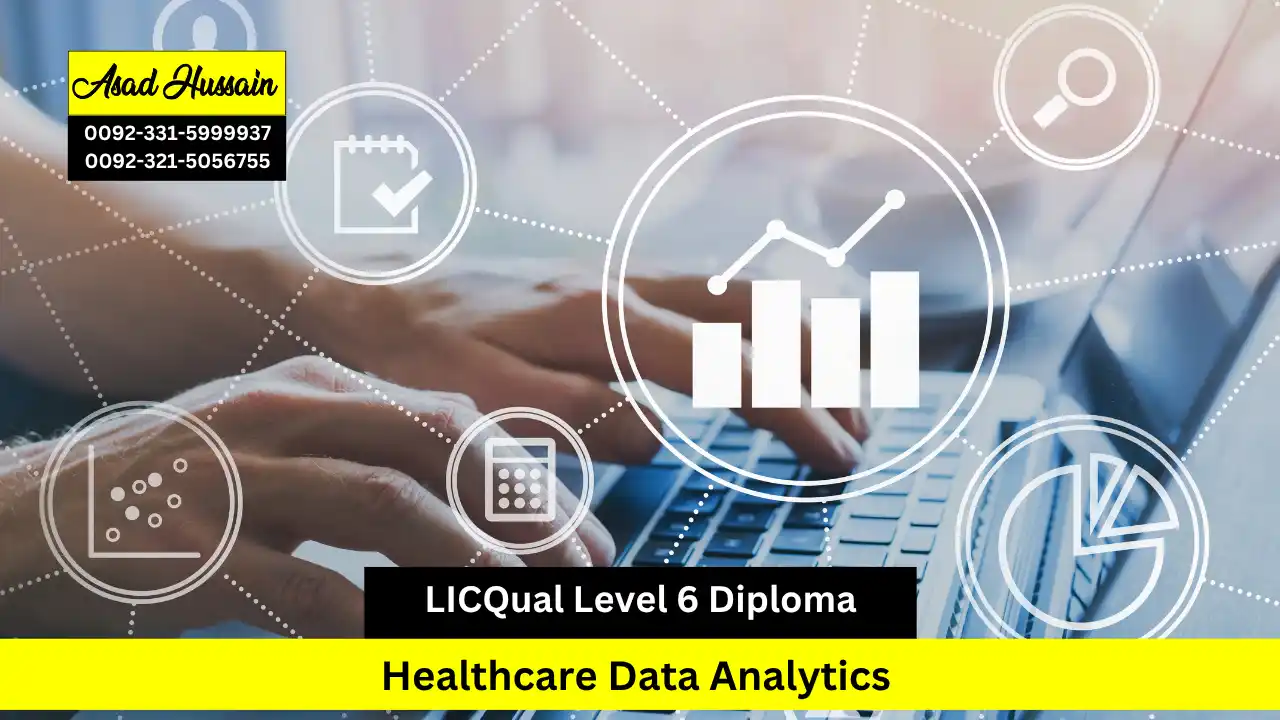The LICQual Level 6 Diploma in Healthcare Data Analytics is a globally recognized qualification designed to equip professionals with the advanced analytical, technical, and strategic skills needed to harness the power of data in modern healthcare systems. As the demand for evidence-based decision-making continues to rise, this course empowers learners to transform raw healthcare data into actionable insights that improve patient outcomes, enhance operational efficiency, and support strategic leadership.
LICQual Level 6 Diploma in Healthcare Data Analytics provides a deep understanding of data analytics principles, health informatics, and data-driven decision-making within healthcare environments. Learners will explore the use of big data, statistical modeling, and predictive analytics to identify trends, forecast demands, and enhance clinical and administrative processes. The program blends theoretical foundations with practical applications, ensuring that learners can interpret complex healthcare data sets and make informed, impactful decisions.
Throughout the LICQual Level 6 Diploma in Healthcare Data Analytics, participants will develop proficiency in using analytical tools, data visualization platforms, and advanced software that support healthcare innovation. The course also emphasizes data governance, security, and compliance with healthcare regulations, preparing learners to handle sensitive information ethically and professionally. These competencies are essential for maintaining patient trust and meeting the rigorous standards of healthcare institutions worldwide.
The course is ideal for healthcare professionals, administrators, and analysts who aspire to advance their careers in healthcare management, data analytics, or health informatics. By understanding how to interpret and leverage data effectively, learners can play a pivotal role in driving digital transformation and improving healthcare delivery systems.
The LICQual Level 6 Diploma in Healthcare Data Analytics, graduates will be equipped with the analytical mindset and practical expertise required to lead data-driven initiatives across hospitals, research institutions, and public health organizations. They will emerge as strategic thinkers capable of shaping the future of healthcare analytics, supporting innovation, and contributing to more efficient, equitable, and patient-centered healthcare systems globally.
Program Highlights
Mandatory Units
- Principles of Healthcare Data Analytics
- Statistical Methods and Data Interpretation
- Predictive Analytics and Modelling
- Healthcare Informatics and Digital Systems
- Data Governance, Ethics, and Compliance
- Strategic Decision-Making Using Data Analytics
The LICQual Level 6 Diploma in Healthcare Data Analytics is designed for professionals aiming to enhance their expertise in data interpretation, statistical analysis, and digital health management. To ensure that learners gain the maximum benefit from this advanced qualification, candidates must meet certain academic, professional, and language requirements. These criteria ensure that students are well-prepared to engage with complex data-driven healthcare systems and analytical methodologies.
Age Requirements
• Learners must be 19 years of age or older at the start of the course.
• This ensures that participants have the maturity and professional awareness necessary for studying advanced healthcare data concepts.
Educational Requirements
• A Level 5 qualification or equivalent in healthcare, data science, information management, or a related field is required.
• Candidates with prior education in healthcare administration, nursing, public health, or information technology are encouraged to apply.
• Those with extensive professional experience but without formal qualifications may also be considered on a case-by-case basis.
Professional Experience
• Relevant experience in healthcare, health informatics, data analysis, or administration is highly recommended.
• Professionals currently working in healthcare institutions, research centers, or government health agencies will find this qualification particularly valuable.
• Practical experience in data management, financial planning, or patient information systems will further enhance learning outcomes.
English Language Proficiency
• Since the course is delivered in English, learners must demonstrate proficiency in both written and spoken English.
• Applicants from non-English-speaking backgrounds should provide evidence of English competency through recognized qualifications such as IELTS or equivalent.
• Strong communication skills are essential for understanding technical data and effectively presenting analytical insights.
The LICQual Level 6 Diploma in Healthcare Data Analytics equips learners with advanced analytical skills, technical expertise, and strategic insight to manage and interpret complex healthcare data effectively. The following learning outcomes outline the key knowledge, competencies, and practical applications that learners will achieve upon completing each unit. These outcomes are designed to ensure measurable professional growth and a strong understanding of how data analytics can enhance healthcare quality, efficiency, and innovation.
Principles of Healthcare Data Analytics
• Develop a comprehensive understanding of data analytics concepts and their role in improving healthcare outcomes.
• Identify various data types and sources used in healthcare settings, including clinical, operational, and financial data.
• Apply fundamental data analysis techniques to support evidence-based decision-making in healthcare management.
• Understand the importance of data-driven strategies for improving patient care, operational efficiency, and organizational performance.
• Evaluate the impact of emerging technologies and digital tools on healthcare data analytics.
Statistical Methods and Data Interpretation
• Apply advanced statistical methods to analyze healthcare data and derive meaningful insights.
• Interpret statistical results accurately to support decision-making and performance improvement in healthcare organizations.
• Utilize statistical software and data visualization tools for effective analysis and presentation of results.
• Understand sampling techniques, probability concepts, and hypothesis testing within the context of healthcare research.
• Assess data reliability, accuracy, and variability to ensure high-quality analytical outcomes.
Predictive Analytics and Modelling
• Design and implement predictive models to forecast healthcare trends, patient outcomes, and resource utilization.
• Use data mining techniques and machine learning algorithms to identify patterns and risk factors in large healthcare datasets.
• Evaluate the performance and accuracy of predictive models for healthcare applications.
• Integrate predictive analytics into clinical and administrative decision-making to optimize service delivery.
• Understand the ethical considerations and limitations of predictive analytics in healthcare environments.
Healthcare Informatics and Digital Systems
• Gain proficiency in healthcare informatics systems, including Electronic Health Records (EHRs) and data management platforms.
• Understand the integration of digital technologies and interoperability across healthcare systems.
• Analyze how digital health innovations contribute to patient engagement, quality improvement, and data-driven care.
• Apply informatics principles to manage, share, and protect healthcare information effectively.
• Explore emerging trends in digital health such as telemedicine, AI-driven diagnostics, and mobile health applications.
Data Governance, Ethics, and Compliance
• Understand the principles of data governance and their application in healthcare organizations.
• Ensure compliance with data protection laws and regulations such as GDPR and HIPAA.
• Evaluate ethical issues related to data collection, storage, and usage in healthcare analytics.
• Develop policies and frameworks for maintaining data accuracy, transparency, and security.
• Promote a culture of ethical responsibility and accountability in data management practices.
Strategic Decision-Making Using Data Analytics
• Utilize data analytics to drive strategic planning and organizational improvement in healthcare.
• Interpret and present analytical insights to support executive decision-making and policy development.
• Apply financial and operational data analysis to improve resource allocation and performance monitoring.
• Lead data-driven initiatives that enhance patient satisfaction, safety, and service quality.
• Integrate business intelligence tools to support long-term healthcare strategy and innovation.
The LICQual Level 6 Diploma in Healthcare Data Analytics, learners will possess the technical expertise, analytical reasoning, and leadership skills required to transform data into actionable insights. Graduates will be equipped to take on roles in healthcare analytics, data management, informatics, and policy development, contributing to improved efficiency, accuracy, and innovation across global healthcare systems..
The LICQual Level 6 Diploma in Healthcare Data Analytics is an internationally recognized qualification designed for professionals who aspire to lead the transformation of healthcare through data-driven decision-making. As healthcare systems worldwide increasingly rely on digital information and analytics to improve patient care, operational efficiency, and policy outcomes, this program equips learners with advanced analytical, technical, and strategic skills to interpret, manage, and utilize healthcare data effectively. By integrating theoretical foundations with hands-on applications, the diploma prepares individuals to make evidence-based decisions, enhance organizational performance, and support innovation in healthcare delivery and management.
Healthcare Data Analysts and Managers
• Professionals currently working or aspiring to work in data analytics, business intelligence, or performance management within healthcare organizations.
• Individuals seeking to enhance their ability to collect, analyze, and interpret complex healthcare data to improve clinical and operational outcomes.
• Data managers aiming to implement effective analytical strategies that support informed decision-making and quality improvement.
• Learners focused on applying data visualization, statistical analysis, and digital tools to solve real-world healthcare challenges.
• Professionals committed to using analytics for evidence-based planning, predictive modeling, and resource optimization in healthcare environments.
Healthcare Administrators and Decision-Makers
• Managers, executives, and administrators in hospitals, clinics, or public health institutions seeking to strengthen data-driven leadership and strategy development.
• Professionals aiming to integrate analytics into healthcare policy, finance, and operational management.
• Administrators dedicated to improving performance, efficiency, and patient satisfaction through the use of accurate and timely data insights.
• Individuals aspiring to bridge the gap between clinical care and data analysis for enhanced organizational performance.
• Leaders seeking to promote transparency, accountability, and evidence-based governance in healthcare systems.
Public Health Professionals and Researchers
• Public health experts and researchers integrating data analytics into health surveillance, population health studies, and epidemiological analysis.
• Individuals seeking to apply statistical models and predictive analytics to assess public health interventions and disease trends.
• Professionals analyzing large-scale health data to guide public policy and improve community health outcomes.
• Researchers dedicated to transforming health data into actionable insights that inform national and international health strategies.
• Learners committed to advancing public health through the application of innovative analytical tools and data interpretation techniques.
IT and Health Informatics Specialists
• Information technology and informatics professionals aiming to specialize in healthcare data systems, integration, and digital transformation.
• Individuals responsible for managing healthcare databases, electronic health records (EHRs), and interoperability frameworks.
• Professionals ensuring secure data handling, privacy, and compliance with international health information regulations.
• Learners applying informatics and analytics principles to improve patient safety, operational workflows, and healthcare outcomes.
• Experts working to develop smart, technology-enabled solutions that enhance healthcare data management and accessibility.
Policy Analysts and Healthcare Consultants
• Consultants and policy analysts advising healthcare organizations, ministries, or NGOs on data-driven strategies and performance evaluation.
• Professionals supporting healthcare policy formulation through accurate interpretation of health data and analytics reports.
• Advisors evaluating the effectiveness and financial impact of healthcare programs using statistical and predictive tools.
• Individuals designing data governance frameworks that promote ethical data use and compliance with legal standards.
• Consultants leading projects that enhance healthcare system transparency, accountability, and evidence-based decision-making.
Career-Focused Learners and Future Healthcare Analysts
• Individuals aspiring to establish or advance careers in healthcare data analytics, informatics, or digital transformation.
• Learners preparing for leadership roles in healthcare research, operations, and technology-driven innovation.
• Professionals seeking to strengthen their data literacy and analytical decision-making capabilities in healthcare contexts.
• Career-oriented individuals motivated to lead initiatives that optimize patient outcomes, cost efficiency, and healthcare sustainability.
• Learners aiming to become data-savvy professionals capable of driving innovation, efficiency, and quality in healthcare organizations.
The LICQual Level 6 Diploma in Healthcare Data Analytics is ideal for individuals passionate about advancing healthcare through data intelligence, innovation, and informed decision-making. Graduates will possess the analytical, technical, and leadership competencies required to interpret complex datasets, develop predictive models, and influence strategic healthcare policies. This qualification opens pathways to rewarding careers in healthcare analytics, informatics, data governance, and public health research — empowering professionals to lead the digital transformation of modern healthcare systems..







